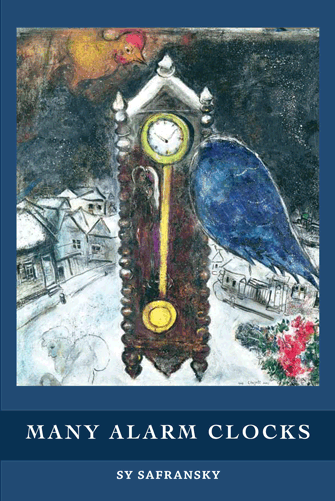
In 1974 Sy Safransky borrowed fifty dollars to start The Sun. As the magazine has grown, he’s become a busy editor and publisher,
but he still gets up before sunrise to write in his journal, occasionally publishing excerpts in a section of the magazine called Sy
Safransky’s Notebook. Many Alarm Clocks offers a selection of those excerpts from the last fifteen years: a lyrical, highly personal,
often self-deprecating series of ruminations on love and loss, faith and doubt, hypocritical Republicans and feckless Democrats.
Safransky writes about loving his wife and about eating too much and about not meditating enough and about getting older every
day no matter how many vitamins he takes. Sometimes he talks to the dead. Sometimes he argues with God. He readily admits
there’s a lot he’ll never understand, but he’s determined to honor this brief, mysterious existence by being awake for it.
Quotes and thoughts while reading:
This is a book you keep by your bedside, so that when you need to feel like a human again, you can reach near and grab some wisdom from Sy. There are dozens
and dozens of quotes I could include, so here are a few.
"My first cup of coffee must be strong because I want to be strong. This may be demanding too much of coffee." (p 1)
"This is my life, I think, not a dress rehearsal for some other life. " (p 2)
"I'm learning what it means to tend to my feelings, to be tender with myself in the most fundamental way. This is where
some healing can occur. It doesn't require getting to the roots of my sadness - though I can keep digging if I want to keep digging. I don't need
to condemn my shovel or my small pile of dirt. But the story of my past is the story of my past: nothing less, nothing more." (p 10)
"When I'm empty, I want to feel full. When I'm full, I want to feel empty." (p 17) I can't tell you the number of times I have fought with this same feeling.
Just Drive recounts when Sy lost his son, just days after birth. He retains it as a lesson in impermanence. I found it deeply moving, and
emotion giving.
"As we lay in bed this morning, Norma asked what I was going to do today. "Save the world," I replied in a deadpan voice. "Did you say save," she asked,
"or savor?" I laughed. "Try savor", she said." (p 47)
J. Krishnamurti: "There is no escape from loneliness; it is a fact and escape from facts breeds confusion and sorrow." (p 54)
"What is psychiatrists came up with different language to describe the suffering of people who troop in their consulting rooms every day? Instead of
diagnosing a young woman with "borderline-personality disorder," how about "lost in the realm of fluttering leaves"? Instead of "depression" how
about "buried by avalanche, still breathing"? And, just as the Inuit have different words for snow on the ground and snow in the air and snow that drifts,
maybe we could have different words for tears: tears we'll forget by tomorrow, tears we never cried but should have, tears that fall from our children's
eyes, tears that fall too quickly to wipe away." (p 60)
"Yes, it's true: America isn't the country she used to be; unhealthy habits take their toll. Tonight America sits in her mansion, brooding. Her hair is wild;
her rob is soiled; the smell of death clings to her. She knows what they're saying: Britain and Germany - even France, that haggard slut - think they're better
than she is. Why? Because they've accepted the fact, or so they insist, that their best days are behind them? Well, fuck them, she thinks, and
fuck the lessons of history. She stubs out her cigarette, stands unsteadily, then squeezes into an outfit that's been too tight on her since the end of World
War II. Soon she'll be walking out the door with that little spring in her step that was once the envy of the world." (p 69)
On p 82 Sy talks about bargaining with God as a child, that he would trade 10 years of his life if the fighting would stop. I, too, have made this bargain. But it seems
God thinking I should stick around for those extra 10 years.
I find it fascinating, as does Sy (p 112), how for a nation of immigrants we are so unaccepting of new immigrants.
In regards to weight loss: "Even the mirror yawns. You've got to show me something better than that, the mirror says. How about
light pouring out of your third eye? Wounds where the nails pierced your hands?" (p 120)
G.I. Gurdjieff: "A man may be awakened by an alarm clock. But the trouble is that a man gets accustomed to the clock far too quickly and ceases to hear it.
Many alarms clocks are necessary and always new ones." (p 166)
"I can't seem to get it right. I don't give enough to the poor, or remember to be thankful for every bite, or fully grasp what a marvelous world we're destroying.
Everything that should matter all the time matters only some of the time; everything that should never matter - well, sometimes it matters quite a bit." (p 176)
I watched a Ted talk on "4 in the morning", and literally, right after I watched it, the next short I read had the words "For years, I used to get up at four every morning" (p 197). You
can't ask for anything better than that.
"The muse finally arrives, without a word of apology. (But God forbid if I'm not here on time.) She unbuttons her blouse, slips off her skirt. It's been so long, I stammer.
What if I do something stupid? She laughs. Of course you'll do soemthing stupid. (p 198)
© JKloor 2015 Books
